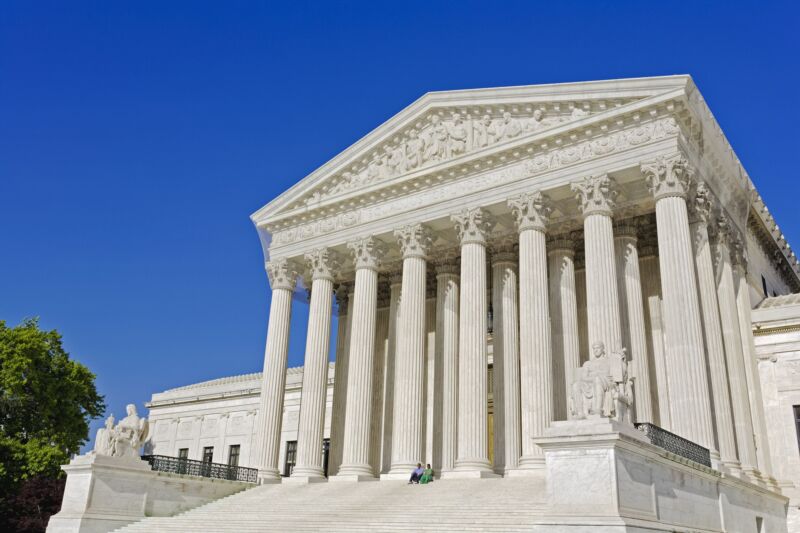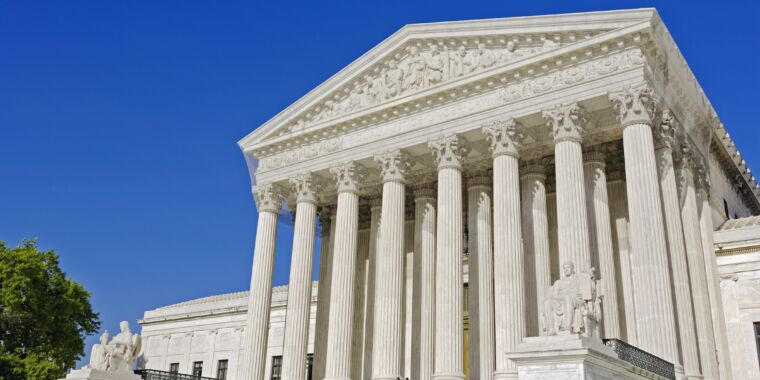
Getty Images | Rudy Sulgan
This article originally appeared on Inside Climate News, a nonprofit, independent news organization covering climate, energy, and the environment. It is republished with permission. Sign up for the newsletter here.
Of the many obstacles to enacting federal limits on climate pollution, none is more daunting than the Supreme Court. That’s where the Obama administration’s efforts to regulate power plant emissions ended, and where the Biden administration’s efforts will undoubtedly land.
A forthcoming study seeks to understand how courts handle challenges to these regulations. The study is based on the fact that the legislators who drafted the Clean Air Act in 1970 knew that scientists considered carbon dioxide an air pollutant and that these elected officials intended to limit its emissions.
The study, expected to be published next week in the journal Ecology Law Quarterly, delves deep into congressional archives to reveal what it calls a “broad and largely forgotten conversation among leading scientists, top federal agency executives, members of Congress” and senior staff under Presidents Lyndon Johnson and Richard Nixon. That conversation described what had become the accepted science showing that carbon dioxide pollution from fossil fuels was building up in the atmosphere and would eventually warm the global climate.
The findings could have important implications in light of a legal doctrine the Supreme Court established when it struck down the Obama administration's power plant regulations, said Naomi Oreskes, a professor of the history of science at Harvard University and lead author of the study. That so-called “big questions” doctrine held that when courts hear criticism of regulations with broad economic and political implications, they should consider the original intent of lawmakers and the broader context in which legislation was passed.
“The Supreme Court has implied that it is impossible that the Clean Air Act was really intended to apply to carbon dioxide because Congress simply did not really know about this issue at the time,” Oreskes said. “We think our evidence shows that to be false.”
The work began in 2013 after Oreskes arrived at Harvard, she said, when a phone call from a colleague raised the question of what Congress knew about climate science in the 1960s when it was developing legislation for the Clean Air Act. She had already co-authored the book Merchants of Doubtabout the efforts of industry-funded scientists to cast doubt on the risks of tobacco and global warming, and was familiar with the work of scientists who studied climate change in the 1950s. “What I didn't know,” she said, “was how much they had communicated about this, particularly to Congress.”
Oreskes hired an investigator to begin the search, and what they both found surprised her. The evidence they uncovered included articles cataloged by the law’s chief architect’s staff, records of scientific conferences attended by members of Congress, and correspondence with constituents and science advisers to Johnson and Nixon. The material included documents pertaining not only to environmentalists but to other prominent members of Congress as well.
“These were people who were really at the center of power,” Oreskes said.
When Sen. Edmund Muskie, a Democrat from Maine, introduced the Clean Air Act of 1970, he warned his colleagues that unchecked air pollution would continue to threaten “irreversible atmospheric and climatic changes.” The new research shows that his staff had compiled reports that established the science behind his declaration. He and other senators had attended a 1966 conference at which carbon dioxide was discussed as a pollutant. At that conference, Sen. Gaylord Nelson of Wisconsin warned about carbon dioxide pollution from burning fossil fuels, which he said “is believed to have drastic effects on the climate.”
The newspaper also cites a 1969 letter to Senator Henry “Scoop” Jackson of Washington from a constituent who had heard poet Allen Ginsberg warn of melting polar ice caps and widespread global flooding on the Merv Griffin show. The voter was skeptical of the message, calling Ginsberg “one of America’s best lunatics” and asking the senator to correct the record: “At the end of the day, there are a couple million people watching this show, people of very different degrees of intelligence, and the possibility that these kinds of allegations — even from an Allen Ginsberg — will be even partially accepted is dangerous.”

